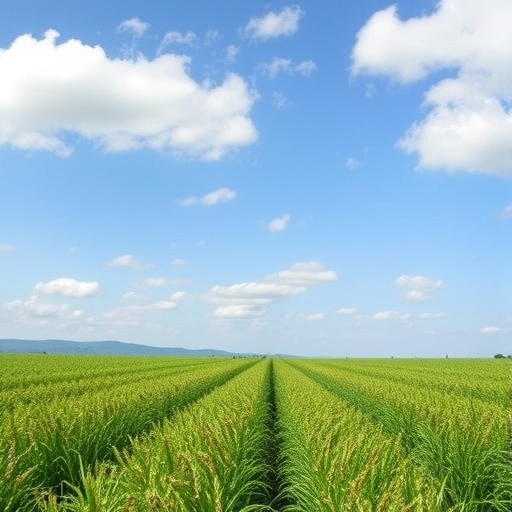In the wake of persistent climate challenges and economic uncertainties, the European Union (EU) faces crucial decisions regarding the future of its Common Agricultural Policy (CAP). The CAP has long been the mainstay of agricultural support within Europe, establishing a framework for sustaining rural communities while simultaneously addressing environmental concerns. The recent contributions by Heyl, Garske, and Stubenrauch encapsulate a transformative vision for the CAP post-2027, focusing on environmental performance as a core outcome of agricultural practice. The push for a performance-oriented CAP represents not merely a shift in agricultural strategies but an essential evolution towards a more resilient and sustainable agricultural landscape within Europe.
The authors emphasize that traditional agricultural approaches often compromise ecological integrity, leading to biodiversity loss and increased greenhouse gas emissions. This awareness has propelled the EU to reconsider its agricultural vision fundamentally. By integrating sustainable practices into CAP incentives, the policy can champion ecological stewardship while ensuring food security. This dual objective necessitates innovative mechanisms that allow farmers to adopt practices that enhance environmental quality. The research hints at a paradigm shift where farmers are recognized for their contributions to environmental health alongside their productivity metrics.
Central to the proposed changes in the CAP is the performance-oriented system that rewards farmers for achieving measurable environmental outcomes. This concept relies on transparent metrics to assess not only productivity but also ecological impacts. By employing distinct indicators to gauge performance related to soil health, carbon sequestration, and water management, the EU can foster a culture of accountability and sustainability. Such metrics could revolutionize how farmers participate in the agricultural market, ensuring that environmental health metrics go hand in hand with traditional outputs.
To facilitate this transition, the authors call for a robust set of tools and provisions within the CAP framework. Financial incentives aligned with sustainable practices can help restore ecological balance while supporting rural economies. Additionally, flexible regulatory frameworks may empower farmers to experiment with practices that yield tangible environmental benefits without compromising their economic viability. The integration of technology, including precision agriculture and digital tracking, will further augment these efforts, allowing stakeholders to monitor real-time impacts and efficiency.
Renewable energy production on agricultural lands represents another avenue for aligning CAP with environmental objectives. Incorporating renewable energy generation, such as solar panel installations on farmland, could serve as a lucrative financial supplement for farmers while aiding in Europe’s transition to a low-carbon economy. As the EU commits to ambitious climate targets, integrating renewable energy initiatives into agricultural policy will not only decrease greenhouse gas emissions but will also create synergies between agriculture and energy sectors.
In addressing public perceptions, the authors urge transparency in communications surrounding the CAP’s evolution. Building trust with both consumers and farmers is paramount as the EU introduces complex policy adjustments. Engaging stakeholders during the policy development process can foster a more inclusive approach that balances productivity, profitability, and environmental stewardship. Furthermore, educational initiatives can inform farmers about the long-term benefits of sustainable practices, thereby driving widespread adoption of performance-oriented farming practices.
International collaboration stands out as a critical component in achieving a sustainably agricultural future. The authors highlight that no single country can realize these ambitions in isolation; rather, a coordinated global approach is necessary. By sharing best practices and technologies across borders, nations can address common challenges while aligning their agricultural policies with global sustainability goals. This international cooperation will illuminate pathways toward achieving sustainable agricultural systems on a larger scale.
As the clock ticks towards the implementation of reforms following 2027, regional disparities must also be considered. Different farming systems across Europe have unique challenges and opportunities related to environmental performance. Hence, tailoring the CAP to reflect local conditions and agricultural practices is essential. Simplifying the application of sustainable practices in diverse contexts will ensure that all European farmers, regardless of size or system, benefit from the support offered under the CAP.
In summary, the reimagined CAP presents an opportunity to harmonize agricultural productivity with environmental imperatives. The performance-oriented vision proposed by Heyl et al. encapsulates a commitment to fostering a resilient agricultural sector that thrives within ecological thresholds. As the reforms take shape, the EU has a pivotal role to play in setting a global example of sustainable agricultural policy that promotes food security and ecological integrity.
The upcoming years will undoubtedly be defining for agricultural policy in Europe. Farmers and stakeholders must remain vigilant and proactive as the landscape shifts. By embracing a collaborative, evidence-based approach, the EU can effectively transition towards a performance-oriented CAP that fundamentally redefines agriculture for the better. This new trajectory not only promises a greener future but also revitalizes the agricultural sector in a world increasingly characterized by climate uncertainty and economic challenges.
In conclusion, as the strategies unfold, continued discourse around the CAP’s evolution remains vital. With attention to performance and sustainability, Europe has the potential to lead by example, setting a pathway that other regions worldwide may aspire to emulate. The collaborative engagement of farmers, policymakers, and consumers will drive the success of these initiatives and create a resilient agricultural ecosystem capable of thriving amid inevitable global shifts.
Subject of Research: Future of the EU’s Common Agricultural Policy (CAP) post-2027
Article Title: Turning the EU’s agricultural vision into environmental action: A performance-oriented CAP after 2027
Article References:
Heyl, K., Garske, B., Stubenrauch, J. et al. Turning the EU’s agricultural vision into environmental action: A performance-oriented CAP after 2027.
Ambio (2025). https://doi.org/10.1007/s13280-025-02281-y
Image Credits: AI Generated
DOI:
Keywords: CAP, sustainability, agriculture, EU policies, environmental performance, resilience, renewable energy, international collaboration, agricultural productivity, ecological integrity.




